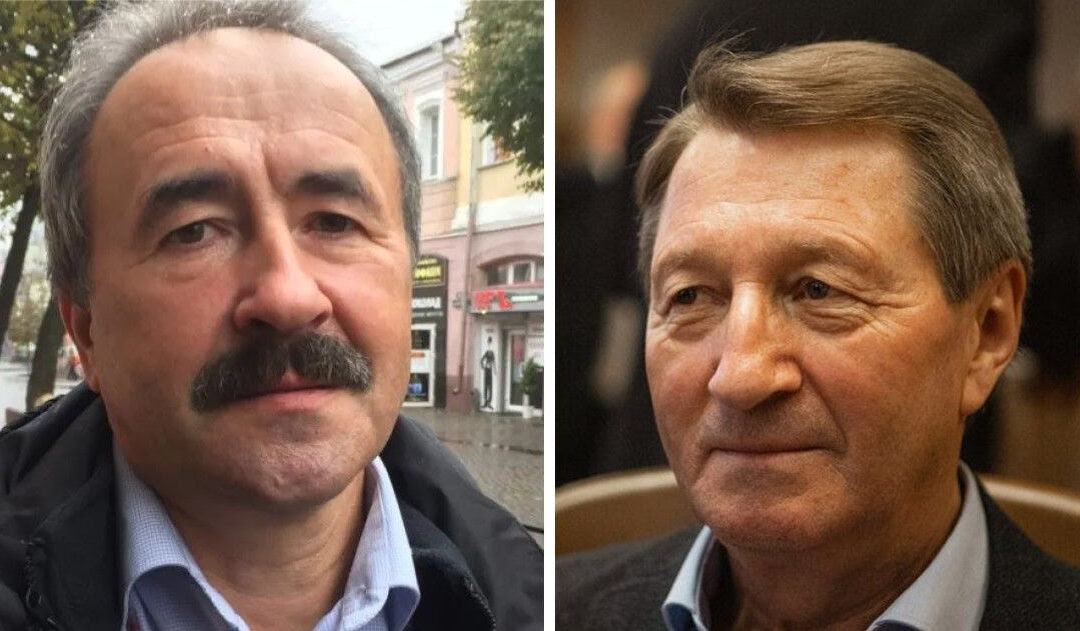
Sep 16, 2025
Two prominent union leaders in Belarus were among 52 prisoners released on September 11. The two political prisoners were arrested in 2022 and 2023 on politically motivated charges for defending workers’ rights.
Both Aliaksandr Yarashuk, chairman of the Belarusian Congress of Democratic Trade Unions (BKDP) and Hennadz Fiadynich, former chairman of the Trade Union of Radio and Electronics Industry Workers’ Union (REP), are now safe in Vilnius, Lithuania.
Their release highlights the vital role of unions in defending democracy, and the ongoing need to support rights defenders facing repression.
Imprisonment, Forced Labor
Yarashuk, 73, was taken to a pre-trial detention center in April 2022 after his home and workplace were searched. In December 2022, he was sentenced to four years in a penal colony where prisoners are housed in barracks and forced to perform labor.
Fiadynich, former leader of the REP, was sentenced in 2023 to nine years in prison.
At least 25 union leaders remain imprisoned on politically motivated charges in Belarus, where the authoritarian president, Alexander Lukashenko, has held power since 1994.
In August 2020, Lukashenko claimed a landslide election victory, sparking widespread claims of fraud and massive protests and strikes, often led by union members, many of them women. Lukashenko’s regime responded with ruthless repression, leading to deaths, injuries, more than 10,000 arrests and the dismantling of the independent Belarus union movement.
Reports say prison conditions include beatings, inadequate medical care, overcrowding and a lack of proper sanitation.
More than 70 union leaders have been imprisoned, including Sergey Antusevich, vice president of the Belarusian Congress of Democratic Trade Unions, who was released earlier this year.
Before his imprisonment, Antusevic described how workers across the country took a stand against violence and injustice during the 2020 protests. Speaking with Solidarity Center Executive Director Shawna Bader-Blau, he shared his hope for a democratic Belarus.
“My inspiration is the people, people who stand and fight.”
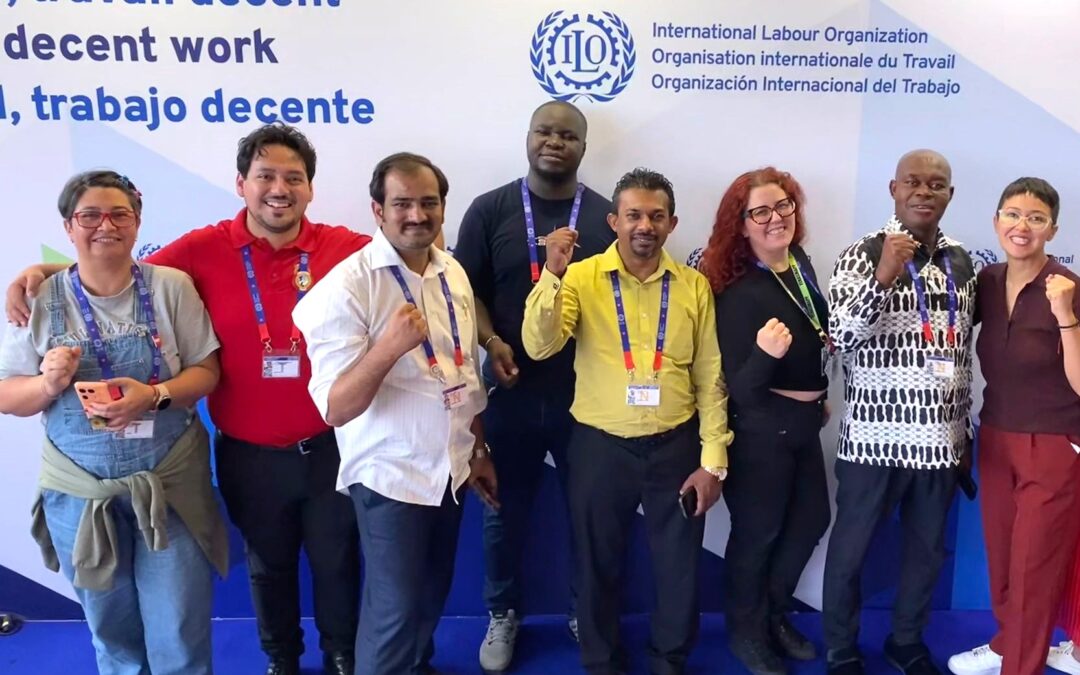
Jul 30, 2025
At the 2025 International Labor Conference (ILC), which took place June 2-14, the Solidarity Center and its partners showcased what happens when workers join together: they speak up and fight for better jobs—and a better world.
The ILC, the annual meeting of the International Labor Organization (ILO), brings together worker, employer and government representatives to debate policy, make decisions and negotiate new international labor standards to promote decent work.
As a result of our unique partnerships with working people and unions from around the world, workers assumed an active role throughout the ILC conference, building on our guiding principle that if working people have the freedom to organize and bargain, they will build more just, inclusive and democratic societies.
With Solidarity Center, Platform Workers Shape a Global Treaty
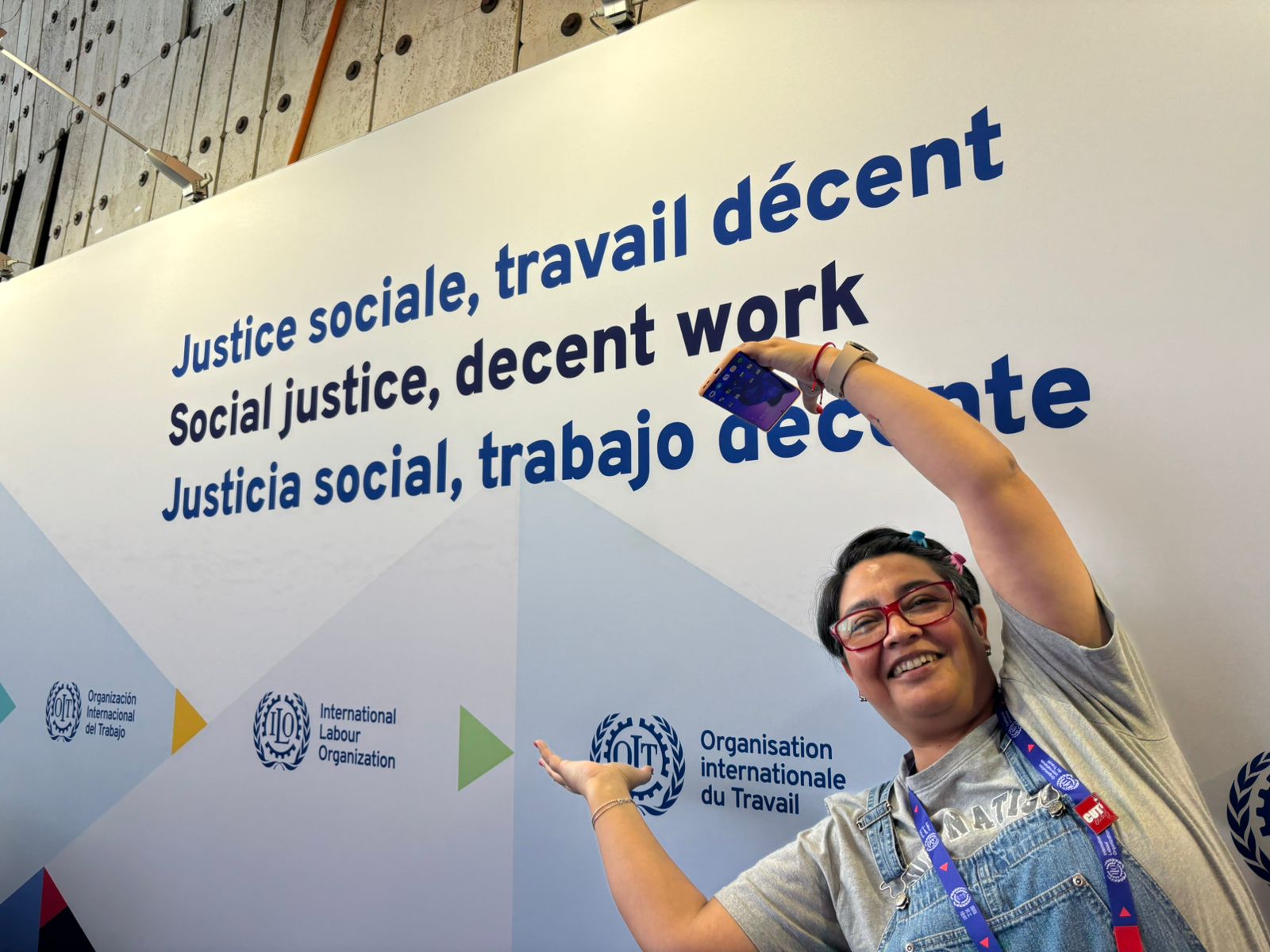
In Chile, Solidarity Center delegate Angelica Salgado Delgadillo heads the Cornershop Union of Uber and serves as a national councilor in the Central Unitaria de Trabajadoras y Trabajadores (CUT). Credit: Solidarity Center
Between 154 million and 435 million workers have online jobs around the world. While platform work is associated with ride hailing and delivery, a broad range of digital platform work is now happening through apps and websites.
A new ILAW Network publication, Taken for a Ride 3 – Lost in a Crowd: How Crowdworkers Are Denied Their Rights at Work, looks at how content moderators, software programmers and other digital platform workers engage in data-related tasks and yet receive no basic workplace rights.
Following years of research and advocacy for the development of a global treaty promoting decent work for app-based workers, led in part by the Solidarity Center’s ILAW Network, the ILO began the process to negotiate a first-ever Convention establishing decent work for platform workers worldwide. (Conventions are legally binding international treaties that may be ratified by member countries.)
“The Solidarity Center Rule of Law team participated actively in the negotiation for a new standard addressing decent work on digital labor platforms, while the Solidarity Center’s Organizing Department coordinated with national platform workers unions to facilitate their participation in the work of the committee,” said Jeffrey Vogt, Solidarity Center Rule of Law director, who also leads the Center’s International Lawyers Assisting Workers (ILAW) Network.
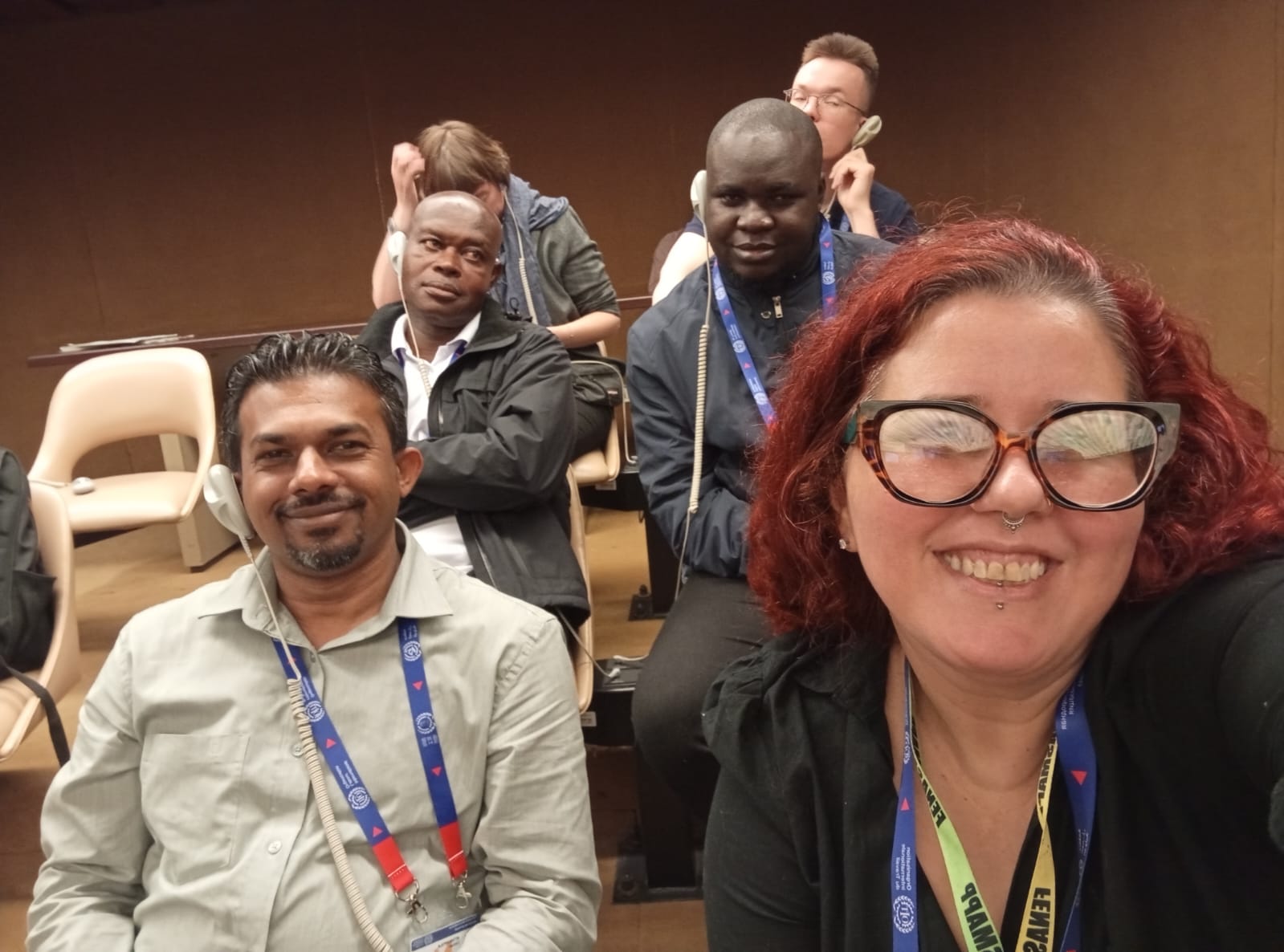
Worker delegates connected with their governments to win support and improvements in an international treaty on the rights of platform workers. Front from left: Charith Attanapola, Sri Lanka; Carina Trindade, Brazil. Rear from left: Philip Aryeh, Ghana; Mophat Okinyi, Kenya. Credit: Solidarity Center
To develop a Convention, workers, employers and government members meet in Geneva to debate and draft its content, and the June conference was the first of two such meetings. Together with digital app-based workers from seven countries, Brazil, Chile, Ghana, Kenya, India, Mexico and Sri Lanka, the Solidarity Center efforts were key to ensuring the proposed Convention and its Recommendations represented workers’ real-life experiences and concerns.
Months before the June ILC met to consider Convention proposals, Solidarity Center worked closely with the platform worker delegates, ensuring they were part of every step—contributing to the ILC’s multiple draft reports, advocating with lawmakers and engaging in training to hone their messages.
“By bringing together workers from multiple regions, the ILC served as a powerful space for South-South exchange,” said Kruskaya Hidalgo Cordero, Solidarity Center field organizing specialist. “Delegates strengthened trust, shared strategies and discussed common challenges such as ensuring labor standards cover digital platform workers.”
Building Worker Power, Democracy
With input into creating the latest draft, the involvement of the Solidarity Center conference delegates was key in discussions and in developing the most recent outline.
Closely coordinating with their unions at the conference, worker delegates provided feedback and recommendations to their government represetatives—who in turn often took supportive positions, raising key points during negotiations and in some cases, adjusting their votes.
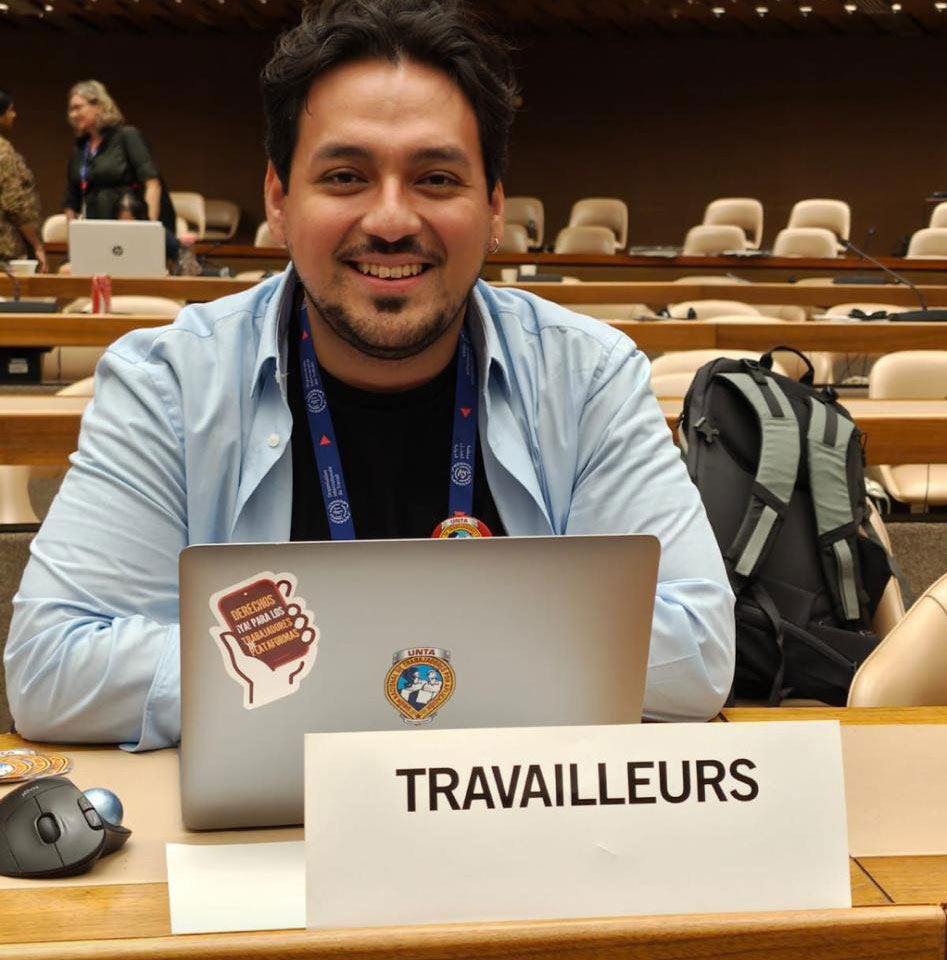
Sergio Guerrero from Mexico was among seven platform workers collaborating with the Solidarity Center to ensure decent work in the gig economy. Credit: Solidarity Center
The result, “Decent Work in the Platform Economy,” was a commitment to a Convention and Recommendation at the end of the process, as well as negotiated definitions and some initial language on the rights of workers to obtain information on automated systems. The platform workers will continue to hone and refine drafts throughout the year, with a final Convention and Recommendation likely adopted at the next ILC in June 2026.
Through ILC participation, the Solidarity Center enabled strong worker power—and worker democracy. Going forward, as part of the Organizing Department’s global platform and broader strategy on platform work, Solidarity Center will create a dedicated space for cross-regional collaboration. Digital app-based workers will take part in a series of virtual exchanges where they will share organizing strategies—strengthening bonds and coordination across regions.
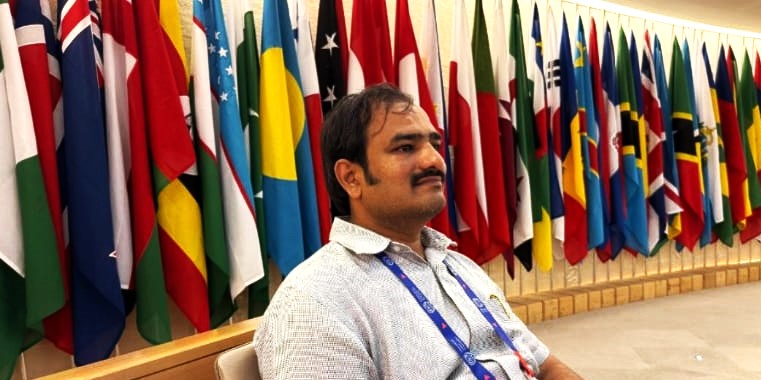
Digital app-based driver, Shaik Salauddin from India, part of the Solidarity Center delegation, frequently reaches out in social media through his union. Credit: Solidarity Center
Creating international connections at the ILC, where digital app-based workers initiated relationships with key global allies , expands connections not only for their organizing networks but also embeds platform worker issues more firmly within global union agendas.
“These interactions deepened the foundation for a worker-led international network capable of sustained collaboration beyond ILC spaces,” said Hidalgo Cordero.
Including Workers’ Voice
To ensure that workers are in the conversations around the informal economy, one Solidarity Center strategy included collaboration with Saida Ouaid, a member of the Democratic Confederation of Labor (CDT) in Morocco.
Ouaid represents agricultural workers, who are among the two billion people globally supporting themselves and their families in the informal economy—including street vendors, domestic workers and tuk-tuk drivers. These workers are not covered by “formal” economy protections, such as job safety and health or health care.
Ouaid actively participated in the ILC general discussion Addressing Informality and Promoting the Transition to Formality for Decent Work to reflect on progress made since the adoption of ILO Recommendation 204 and what else is needed to advance the transition to formality, in recognition that informality remains high.
“Being present gave me the opportunity to voice my organization’s position, which is the urgent need to improve the conditions of informal economy workers and to integrate them into a formal economy that meets the standards of decent work and dignified living,” she said.
The Solidarity Center also provided materials to union partners who sought to participate in the ILC discussions, including several from around Africa. And, the Solidarity Center coordinated positions and priorities with the International Domestic Workers Federation (IDWF), UNI Global and Women in Informal Employment Globalizing & Organizing (WIEGO), key to its efforts to build long-term alliances with global unions and other allies.
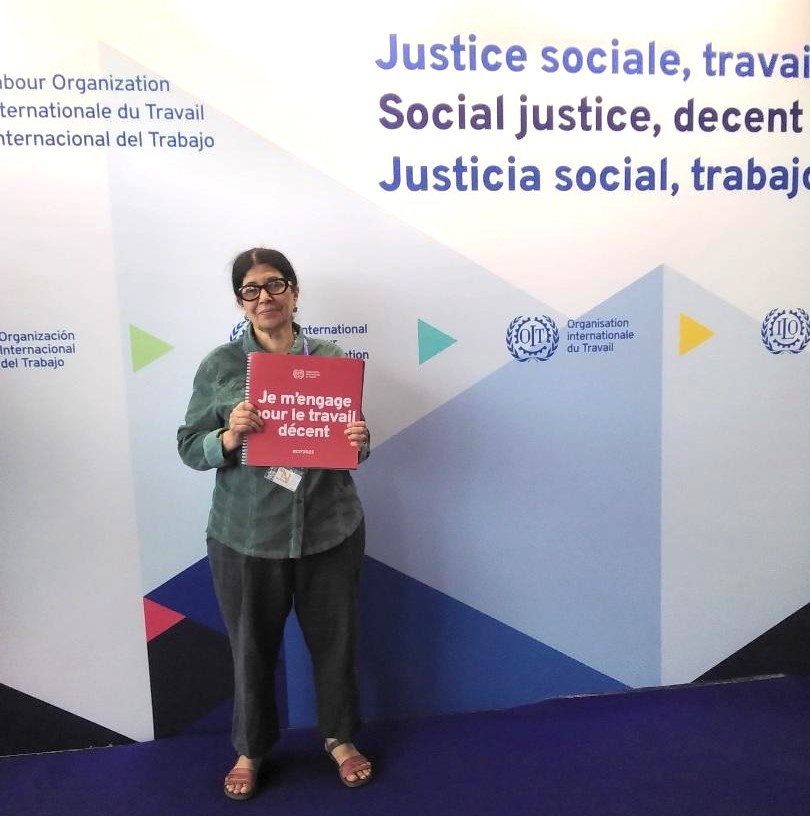
Solidarity Center delegate Saida Ouaid, a member of the Democratic Confederation of Labor in Morocco, pushed to improve conditions for 2 billion workers such as those in agriculture and street vending who are in the informal economy. Courtesy Saida Ouaid
Because working people and their union representative such as Ouaid were a key part of the discussions, they pushed back employer attempts to restrict union membership and collective bargaining to formal workers in accordance with national laws. Ultimately, the final document represents the success of working people in upholding the freedom to form unions and the right to collectively bargain as a right for “all workers” as essential for transitioning to inclusion in fundamental labor rights.
Including workers’ democratic freedom to form unions and bargain together recognizes the Solidarity Center’s core principle that unions are the democratic institutions of the working class that allow working people to stand together, speak up and bargain not only for better jobs, but for a better world.
“Attending this session was a rich and meaningful experience, through the contributions, testimonies and shared experiences of trade unions, during both the Workers’ Group meetings and the general sessions,” said Ouaid.
Workers’ Succeeded in Adding Key Rights
Working in agriculture, as a street vendor or in other jobs in the informal economy increases people’s vulnerability that typically cannot be addressed by a country’s basic labor protections. Workers at the conference were key to the adoption of new language on the necessity of employer and government accountability and creates an environment for transitioning to jobs in the formal economy that lead to worker protections.
Workers’ involvement also shaped the outcomes document so that it represents their lived experiences and the necessity for safe working conditions, by
- Acknowledging the importance of a safe and healthy working environment to decent work and
- Recognizing the role that trafficking, exploitation, stigmatization and harassment in hindering formalization efforts.
“There were a number of important provisions proposed by the workers’ group that were able to ensure the rights of informal economy workers in the final outcomes,” said Erin Radford, senior specialist in Solidarity Center’s Global Worker Empowerment Department.
“In other cases, the workers’ group was successful in eliminating harmful amendments proposed by the employers’ group or governments or in reducing the harm of the amendments. In particular, it was important to ensure nothing in these outcomes would undermine or weaken the 2015 document.”
See all the texts adopted in the June 2025 conference: Texts adopted by the International Labor Conference at its 113th Session.
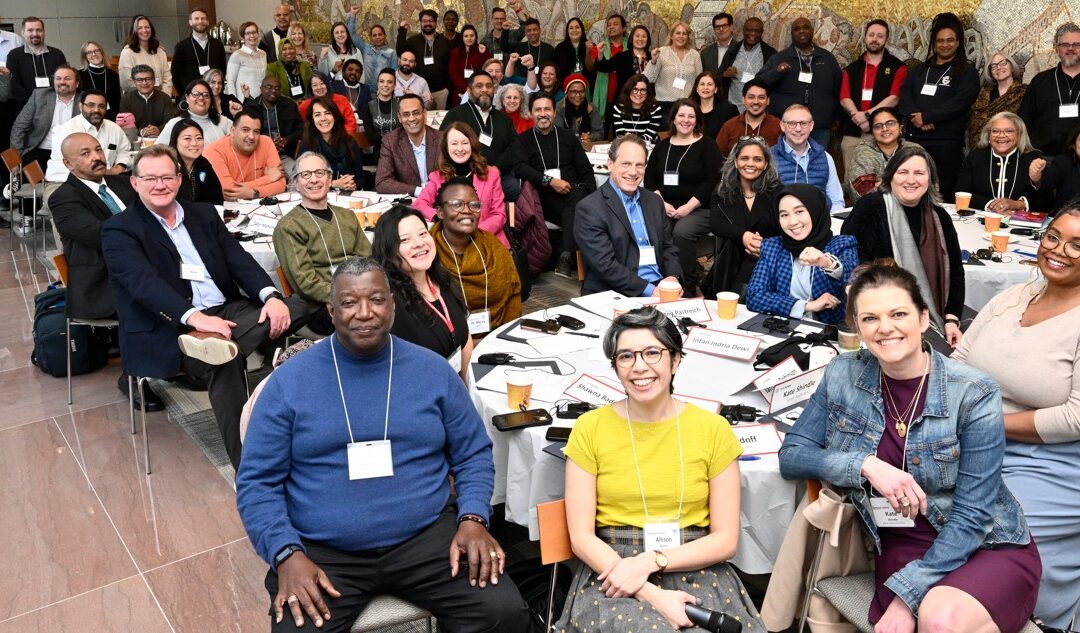
Feb 16, 2024
Dozens of union leaders from around the world who are working to advance democracy in communities and workplaces convened last week in Washington, D.C., to discuss the essential role of unions in leading social change and addressing multiple global crises, including strengthening democracy through the exercise and advancement of worker rights.
As part of the Global Labor Leadership Initiative (GLLI), a Solidarity Center partnership with the Worker Institute at Cornell, 22 union leaders and allies from 17 countries spent two days discussing movement building, the platform economy and strategies to tackle in-country and mutual challenges affecting working people, often in the face of brutal conditions. They then joined more than 70 U.S. and Canadian labor and justice leaders for a two-day event, “Meeting the Moment: How Can Unions Maximize Impact and Power in a Time of Increasing Polarization and Change?” where they shared strategies on how unions can step up efforts to defend and promote worker rights.
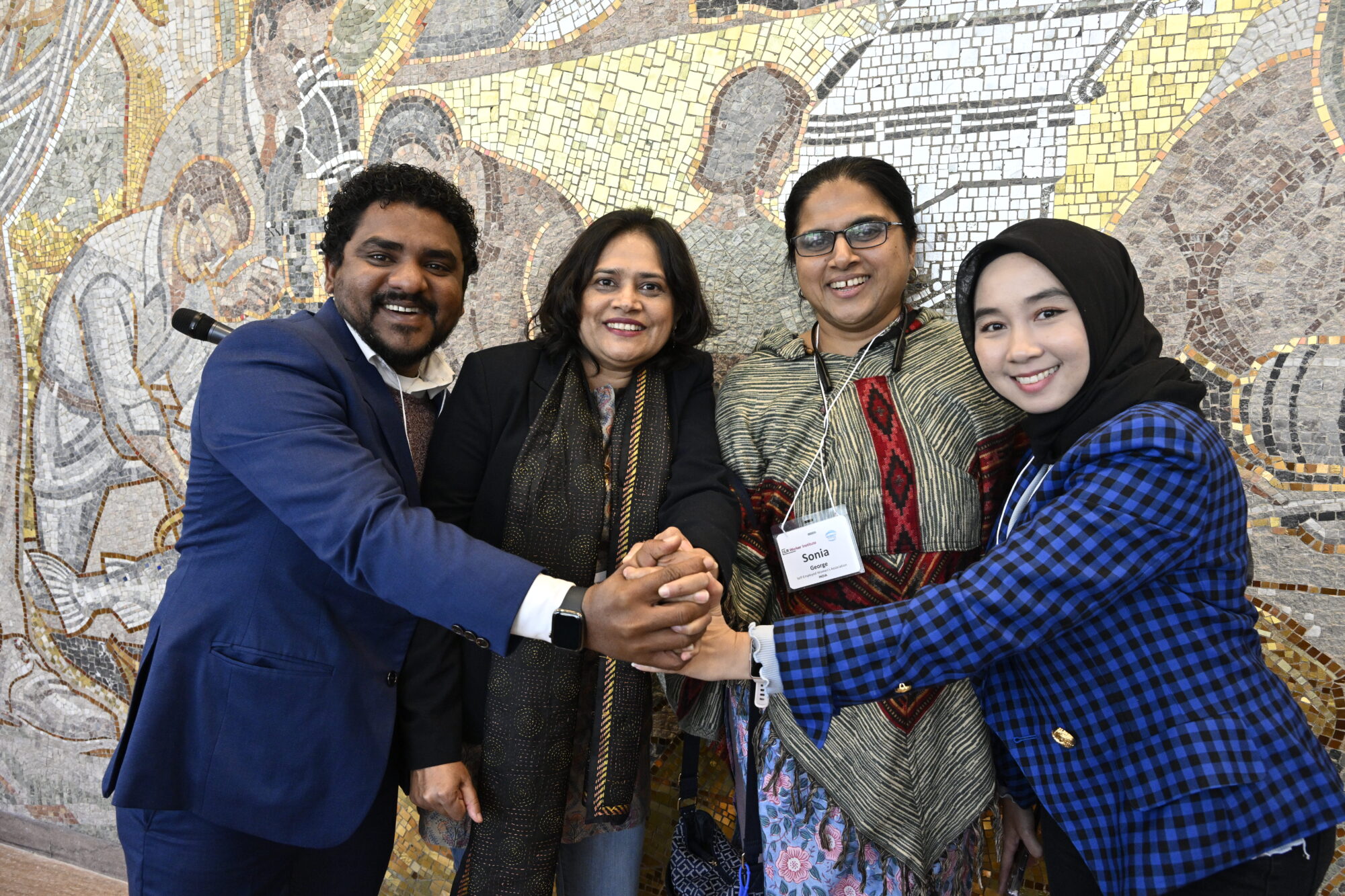
Global Labor Leadership Initiative (GLLI) participants Mauroof Zakir, Tourism Employees Association of Maldives (TEAM) General Secretary and Maldives Trade Union Council President; Nazma Akter, Sommilito Garments Sramik Federation (SGSF) President and founder (Bangladesh); Sonia George, Self-Employed Women’s Association (SEWA) General Secretary; and Intan Indria Dewi, SPN (garment and textile trade union federation) Banten Provincial Chairperson (Indonesia). Photo: Kaveh Sardari
“Democracy exists [only] where workers can be heard,” said Maicon Michel Vasconcelos da Silva, who spoke at the panel event and who serves as secretary of international relations of the Brazil National Confederation of Metalworkers (CNM).
Overwhelming evidence shows that democracy begins at work—in particular, where independent unions provide individuals with the opportunity to elect and be leaders, and join in common cause for better wages, benefits and working hours. Organized labor also holds politicians accountable. In recent years, labor lawyers pushed for justice following Brazil’s deadliest—and entirely preventable—mining disaster. An aviation union in Ukraine exposed rampant corruption in the terminal. And in Colombia, the labor movement shut down the country’s largest port to reach a landmark agreement from the government to live up to its promises to invest in a long-neglected and majority Black city.
Meanwhile, democracy enables workers and their unions to flourish and, as it is increasingly threatened around the world, democracy also depends on working people and their organizations to keep it resilient, said panel speakers and participants, emphasizing unions’ unique role and capacity to push back on unjust and undemocratic forces.
“Unionism and unionizing should really put all of its energy behind democracy,” said Sergio Guerrero in a separate interview. Guerrero, a platform worker in Mexico and general secretary of the National Union of Workers by Application (UNTA), added: “We can’t have a democratic society without unionized workers.”
Yet across every region of the world, “the global cost-of living crisis has been met with a crackdown on the rights of working people,” according to the 2023 International Trade Union Confederation (ITUC) Global Rights Index.”
“Organizing on issues of democracy, of human rights, of preservation of democratic procedure is something I think is essential for us as a union,” said Čedanka Andrić, president of the Serbia Trade Union Confederation Nezavisnost (Independence), who spoke to the Solidarity Center between sessions.
A key takeaway, said many participants, is that democracy cannot be taken for granted.
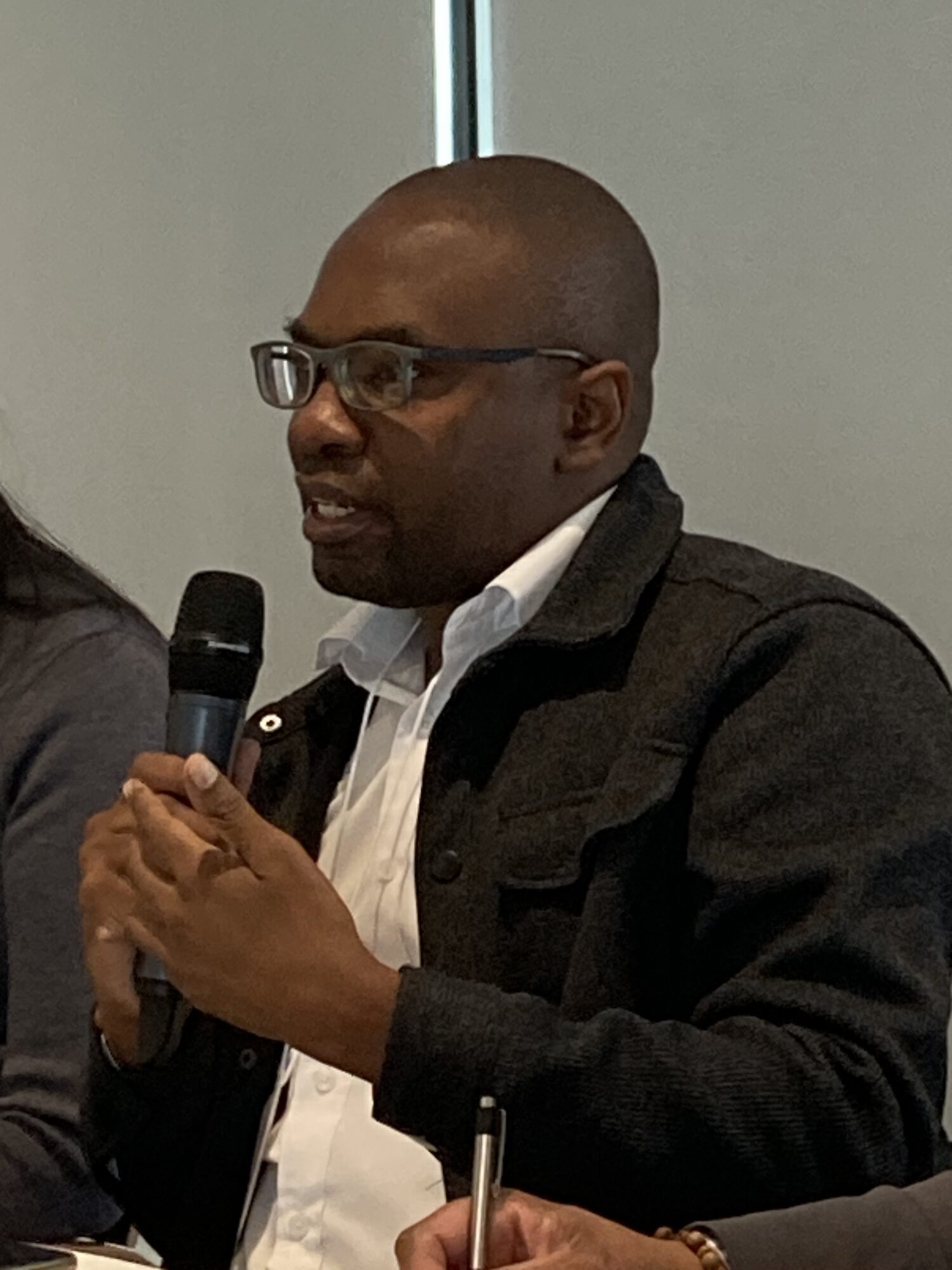
“No one is insulated from dictatorship. No one is safe,” said Peter Mutasa, who had to flee for his life following a violent crackdown on Zimbabwe unions. Photo: Kaveh Sardari
“We learned that the rights won by those who fought before us are transient,” warned Peter Mutasa, chair of the Crisis in Zimbabwe Coalition. Mutasa, former president of the Zimbabwe Congress of Trade Unions (ZCTU), had to flee for his life in 2020 following a violent crackdown on Zimbabwe unions and their leaders that began in 2018.
“No one is insulated from dictatorship. No one is safe,” he said.
The panel event concluded the 2024 GLLI convening. Organized by the Solidarity Center in coordination with Cornell’s ILR Worker Institute, GLLI provides participants with solidarity and skills-building opportunities so they can help build a dynamic, powerful and inclusive labor movement that can transform society and the economy so that it works for workers.
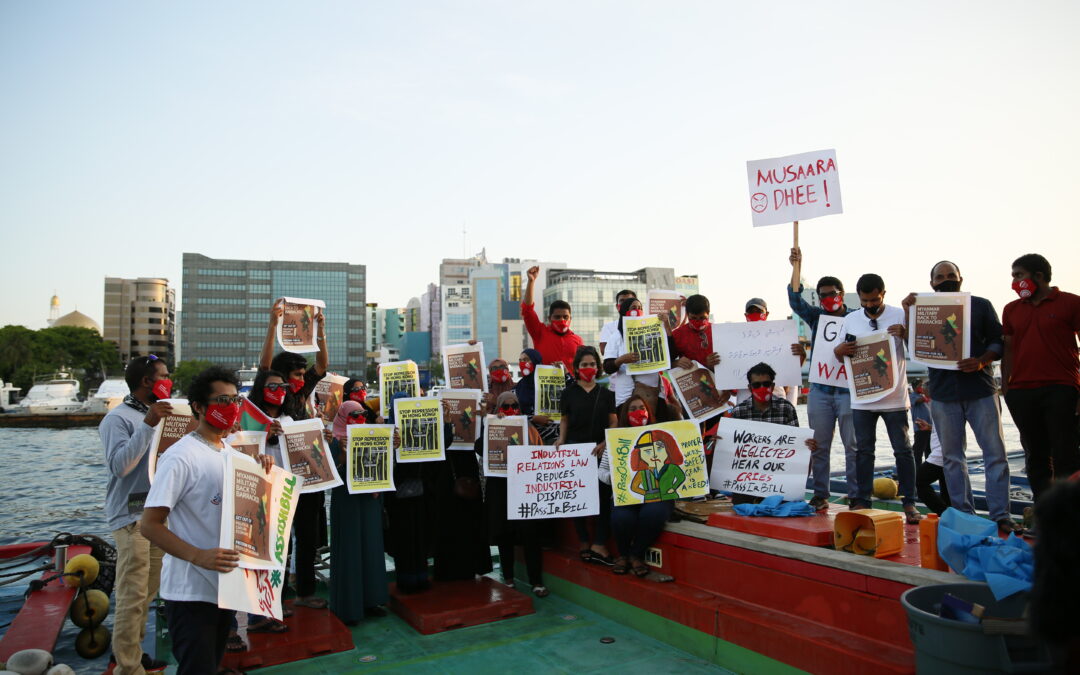
Jan 5, 2024
After a decade of relentless advocacy by the trade unions in the Maldives, President Mohamed Muizzu ratified on January 2 the Industrial Relations and Occupational Safety and Health bills passed by parliament with a super majority in mid December. Enactment of the law marks a monumental stride toward safeguarding worker rights and fostering industrial harmony in the Asian archipelago.
The Industrial Relations Act solidifies a structured framework for consultation and social dialogue among government entities, workers and employers. This framework stands as a beacon for the protection of worker rights, paving the way for economic and social progress, unions say. At its core lies the establishment of the National Tripartite Labor Advisory Council, ensuring the protection of collective bargaining rights and robust mechanisms for resolving industrial disputes through mediation. The Act institutionalizes key worker rights, like the rights to freedom of association and assembly, and empowers both local and migrant workers to collectively negotiate for their interests and welfare.
Simultaneously, the Occupational Safety and Health bill underscores stringent obligations for employers, emphasizing workplace safety standards, compensation frameworks and penalties for non-compliance. This legislation reflects a firm commitment to international standards and fundamental human rights, ensuring a safer and healthier work environment for all.
Congratulating the trade union movement of the Maldives on this crucial victory, Mauroof Zakir, president of Maldives Trade Union Congress (MTUC), said the passage of both bills “represents a historic victory for the working class in the Maldives. It is indeed a great achievement to empower workers and contribute to strengthening the democratic principles of the nation.”
On a similar note, Fathimath Zimna, MTUC general secretary, said, “Enactment of Industrial Relations Act and Occupational Safety and Health Act marks a significant milestone and victory that was achieved through a relentless campaign by Maldives unions. It is an important stride forward in achieving the decent work agenda in the Maldives. The journey of unions and workers will stand as a symbol of resilience and strength to working people of the world. It resembles what working people can achieve through collective voice. It is important for workers to organize into unions and raise their voices collectively to protect workers’ interests to fully entertain the rights given by the two acts.” She added that, “It is just the beginning for many more victories for the working people and their families. We would like to extend our appreciation and gratitude to all our partner organizations, including Solidarity Center and the global union federations for their support and solidarity.”
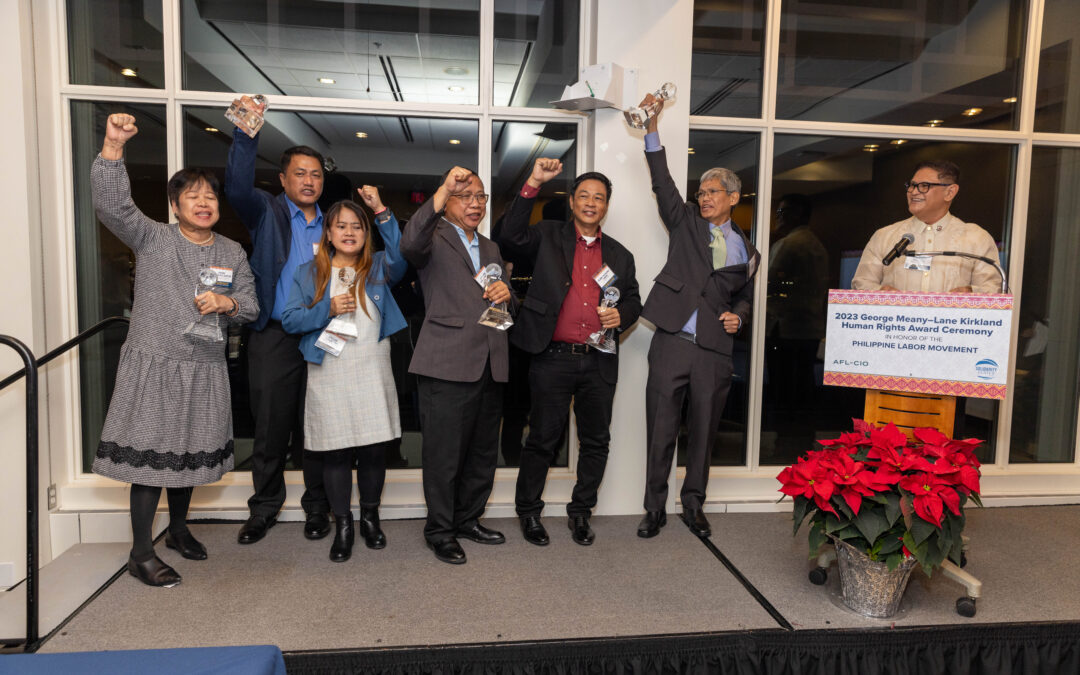
Dec 8, 2023
For their courage and persistence in the face of escalating threats to their own lives, seven delegates representing the Philippine labor movement received the 2023 AFL-CIO George Meany-Lane Kirkland Human Rights Award in a ceremony in Washington, D.C., this week. The award is given annually in recognition of dedication to and effectiveness in highlighting the widespread denial of fundamental human rights at work and in society.
“This award is in recognition of the Philippines labor movement’s resilience, persistence and courage in the face of extreme violence and repression,” said AFL-CIO President Liz Shuler at the event.
More than 70 union members have been killed since 2016, and many more are victims of red-tagging (branding and accusing individuals and/or organizations of being terrorists), illegal firing of union activists and anti-terrorism laws directed at stifling freedom to form unions and bargain.
“The killings are precisely designed to sow fear among workers,” United and Progressive Workers Center (SENTRO) Secretary General Josua Mata told the Solidarity Center.
Persecution has not stopped despite recent changes to the government’s top leadership. Union leader Jude Thaddeus Fernandez, 67, was killed September 29 after a division of the Philippine National Police reportedly entered Fernandez’s home and shot him dead. The murder of Alex Dolorosa—whose role as a union organizer and a paralegal was funded by the Communications Workers of America (CWA)—in April remains uninvestigated like every other extrajudicial killing of a trade unionist in the country.
Workers who are organizing and conducting other union business in the Philippines seek only to build a decent society and life for their families, Trade Union Congress of the Philippines (TUCP) Vice President Luis Corral told the Solidarity Center.
“We are not the enemy,” he said.
In addition to Corral and Mata, the delegation receiving the award for include Alliance of Concerned Teachers (ACT) Secretary General Raymond Basilio; Business Process Outsourcing Industry Employees Network (BIEN) President Mylene Cabalona; Public Services Labor Independent Confederation (PSLINK) President Annie Enriquez Geron; Kilusang Mayo Uno (KMU) Chairman Elmer Labog; and Federation of Free Workers (FFW) President Sonny Matula. The Solidarity Center has a 25-year partnership with the Philippine labor movement, including current support for an organizing campaign for low wage, app-based food delivery workers.
“This recognition fortifies our resolve and validates our efforts under the most challenging of circumstances,” said TUCP President and Philippine Congress House Deputy Speaker Raymond Mendoza when accepting the award, “on behalf of all workers in the Philippines, especially those who gave their lives for labor.”
Previous award recipients include United Nations Special Rapporteur on the rights to freedom of peaceful assembly and of association Maina Kiai and the Tunisian General Labor Union (Union Générale Tunisienne du Travail, UGTT), which also won a shared Nobel Peace Prize for its role in brokering Tunisia’s path to democracy during the Arab uprisings.












